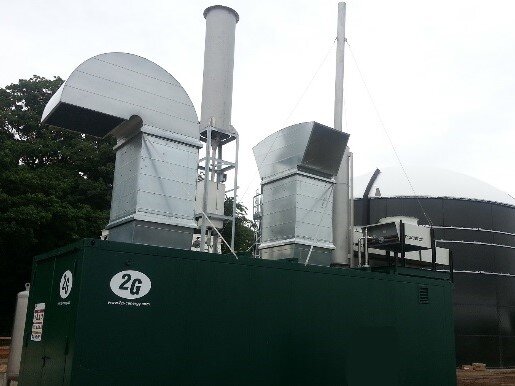MSU Leads the Way in Campus-Based Anaerobic Digestion Technology
The role of 2G Energy Inc. in supplying and installing the CHP system and the gas treatment system
Facts & figures

This application is the largest college campus-based anaerobic digester system in the United States and is located at the Dairy Cattle Teaching & Research Center on the South Campus Farms at the Michigan State University (MSU) in East Lansing, MI. The facility is designed by UTS, an Anaergia Group company, and converts 16,800 tons of food waste per year from campus dining halls, manure from MSU's dairy farm and food processing waste from the local community into renewable energy.
The methane rich biogas produced in the digester will be used to generate clean energy using a CHP system. 2G Energy Inc. was selected to supply and install a fully containerized agenitor 212 thermodynamically optimized MAN-based engine with 400 ekW/h or 3,320 MW p.a. electrical power and 474 kWh/th thermal power output. The renewable electricity will be used on campus while the natural fertilizer created through the process is utilized on agricultural land. In addition to the engine, 2G Energy Inc. supplied a 2G Gas Treatment system consisting of biogas dehumidification for moisture removal as well as a Biogas Flare system. 2G provides completely integrated flare solutions (low emission, low NOx). These fully enclosed flares are specifically designed for biogas applications. 2G flare systems, vapor combustors, and solutions meet EPA regulation 40 CFR 60.18 and are BACT approved. The payback and ROI for this project will come from the energy produced, the fertilizer sales and also from tipping fees. The organic waste is fed into a complete mixed digester (CSTR) where the material will be naturally broken down by microorganisms in the absence of oxygen. The nutrient rich liquid will be separated from the leftover solids leaving the digester and used as natural fertilizer on the surrounding agricultural land. The remaining fibrous solids can be composted for use as renewable bedding material for local dairy cows or sold to the public as fertilizer. MSU's anaerobic digestion project and 2G Energy Inc. advanced biogas CHP energy conversion system generates renewable energy that reduces the dependence on the University's coal-fired power plant and also reduces greenhouse gas emissions. Anaerobically treating multiple waste streams and converting the clean biogas into electricity and thermal energy is a smart way to utilize economies of scale and allows for the most cost effective solution to produce green energy.